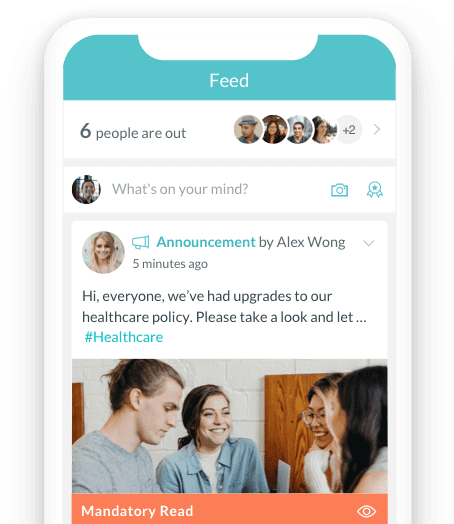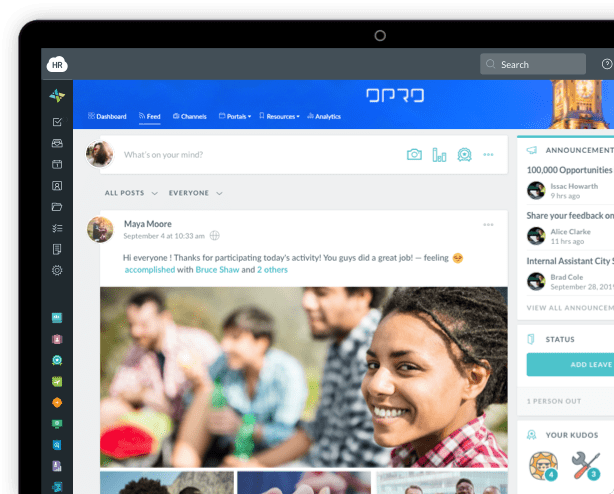Why Effective Communications Between HR and Employees Improves Business Success



 Cut onboarding time
by 60%—here's the
Ultimate Checklist
that helped do it.
Cut onboarding time
by 60%—here's the
Ultimate Checklist
that helped do it.

Your employees are the heart of your business. If you’ve been in leadership for any period, then you know that establishing a strong connection through effective communication is vital to your organizational wellbeing. What you might not have known, though, is the critical role your Human Resources team plays in that process.
HR is responsible for relaying all kinds of important information — employee compensation, training, company news, updates — so any breakdown between HR and your employees will have serious consequences. This article will highlight those consequences, contrast the benefits of strong communication, then show you how to make proper HR-employee communication a priority for your business.
Poor Communication versus Strong Communication
There’s a heavy toll that comes with lackluster internal communication. Here’s how it can drag you down and how HR can intervene to set things right.
Your Employees Won’t Know What You Want From Them
If your business is large enough to have an HR team, then it falls to leadership in your HR team to effectively communicate to employees what is expected of them.
When HR fails to communicate job priorities and responsibilities, your employees won’t have the information they need to align their actions with your overarching business goals. As a result, you’ll fail to hit your objectives and fall behind on your targets for growth.
The remedy to this negative outcome starts during the employee onboarding process, where your HR team can ensure that new hires are clear on their roles and responsibilities.
HR can provide employee handbooks, for instance, that bundle all those initial details into one easily accessible package. That way, employees can refresh their memories on company policies and how they fit into the organization whenever they need.
Down the road, HR can continue to support the alignment of your business goals and employees by keeping them abreast of important organizational changes, upcoming company initiatives, and pertinent strategic plans.

This guide was designed to help you navigate through those difficult tasks and help determine the right software for your organization, download our ebook now.
Download nowYour Employees Won’t Trust You
Let’s say your HR team is communicating details to employees, but those details are, at best, only partially correct. You’d probably label such communication incomplete, might decide that it’s misleading, and you may even go as far as deeming it untruthful.
Your employees are likely to opt for the harsher interpretation, and as a result, will be disinclined to believe what they hear from the HR team. Fast forward, may start to disregard HR altogether, deciding instead to get their information from even less reliable sources.
Ensuring all communications are accurate and complete, on the other hand, is a great way to boost employee trust and engagement. Your employees will feel more confident about the effort they’re exerting on the job and will be more willing to go the extra mile.

Your Employees Won’t Feel Valued
If you’re of the mindset that the only thing your employees value is money, prepare to be mistaken. Recognition and appreciation are key motivators for almost any worker, and a lack of communication from HR may contribute to employees feeling undervalued. Undervalued employees don’t work as hard, and more likely to call it quits.
Conversely, you can have your HR team take the lead on helping employees feel like they are important to the business. Clear and honest communication will be a good start here, but you can build on that with direct efforts to call attention to employee contributions, such as a formal employee recognition program and awards for a job well done.
Fostering Better Communications
Now that you understand the importance of communications between HR and your employees, you might be wondering how you can improve said communications to facilitate better business outcomes. There are three major strategies all employees can leverage to improve their communication skills.
A strong start to the empathy strategy might be evaluating your current communication tools to determine what works and what should be abandoned. Internal communications software is constantly evolving, so be sure to stay abreast of the latest and prepared to make a change if your current tools are hindering performance.
Next, you should ensure that messaging from HR to your employees emphasizes loyalty and remains consistent in its accuracy. This will help build trust and lay the groundwork for a strong employee-brand connection. You can build upon this by making communication a two-way street, and providing opportunities for employees to offer formal feedback.
Finally, don’t underestimate the value of metrics and KPIs. Keep track of these over time, and they’ll help you lock in on (and enhance) your best performing techniques while excising underperformers from your communications strategy.
Wrapping Up
Communication is critical for business, and your HR team should take center stage when it comes to keeping you and your employees on the same page.
Remember that neglecting communications will leave your workers confused and resentful, but emphasizing it can improve engagement and encourage them to perform at their peak.
With the right strategies, you can facilitate communications between your employees and the HR team, aligning everything with your business goals and maximizing the benefits for all.
About Author: This article is written by a marketing team member at HR Cloud. HR Cloud is a leading provider of proven HR solutions, including recruiting, onboarding, employee communications & engagement, and rewards & recognition. Our user-friendly software increases employee productivity, delivers time and cost savings, and minimizes compliance risk.

Keep Reading
Best Workday Alternatives for Mid-Market Companies in 2026: Complete HRIS Comparison Guide
"We implemented Workday and our HR team still can't figure out half the features six
Night Shift, Float Pool, PRN: Onboarding Non-Traditional Nursing Schedules
Most nurse onboarding programs assume everyone works 9-to-5. Your carefully designed
Onboarding Home Health and Community Care Teams Who Never See the Main Office (The Tether Strategy)
You hire them on Monday. They see their first patient on Tuesday. And you might not see
Like What You Hear?
We'd love to chat with you more about how HR Cloud® can support your business's HR needs. Book Your Free Demo

Build a Culture of Recognition. Boost Engagement. Guaranteed.
Workmates empowers employees to stay informed, connected, and appreciated—whether they’re on the front line, in the office, or remote. Recognition drives 12x higher engagement.Trusted by industry leaders in every sector




Cut Onboarding Costs by 60%.
Take the confusion and follow-ups out of onboarding with automated workflows, digital forms, and structured portals—so new hires ramp faster 3X quicker.Trusted by industry leaders in every sector






